|
Hidden credit card charges
|
 |
July 18, 2001: 8:52 a.m. ET
Visa, MasterCard face lawsuits on International currency conversion fees
By Lucy Lazarony
|
NEW YORK (Bankrate.com) - More than a dozen federal lawsuits are taking Visa and MasterCard to task over international currency conversion charges.
The suits claim the fees charged by Visa, MasterCard and several major banks for purchases made outside the United States are excessive and violate the Truth-in-Lending Act.
"It costs them four or five basis points and they're charging 100 basis points. You tell me if you think that's a lot," said Thomas Schrag, a partner with Schrag & Baum, a Berkeley, Calif., law firm.
"They're adding a fee that is a profit center for them and they're not disclosing it," he said.
Schrag estimates that together Visa and MasterCard have made more than $1 billion in international currency conversion charges during the past four years.
Finding the international fees
When you make an overseas purchase with a credit card, the merchant is paid in local currency. But the charge that shows up on your card bill is in U.S. dollars.
Let's say you use a credit card to pay for your meal at a café in Paris. Visa or MasterCard converts the cost of your meal from French francs to U.S. dollars and charges your bank a 1-percent currency-exchange fee for the service. Most banks pass this 1-percent fee on to customers.
| |

|
|
Tracking down currency conversion fees is tricky. | |
Some major banks are tacking on additional fees of their own. Bank of America (BAC: Research, Estimates), Bank One (ONE: up $0.46 to $35.48, Research, Estimates), and Wells Fargo (WFC: Research, Estimates) are among the banks that charge customers 2 percent fees for overseas credit card purchases.
But tracking down international currency conversion fees may be tough. Looking at your credit card bill after an overseas holiday won't help. The fees aren't listed there. You'll have to dig out your cardholder agreement.
"They're disclosing it in a place that no one reads. If they'd disclose it in your bill or in advertisements you'd notice it," Schrag said.
Many travelers are unaware that international currency fees even exist.
"People don't complain about it because they don't understand or know about it," said Frank Janecek, an attorney with Milberg Weiss Bershad Hynes & Lerach in San Diego.
Cards pass the buck to banks
The card associations point out that the individual banks are the ones that actually charge international currency conversion fees to customers.
"We have no relationship with the ultimate holder of the card," said Eileen Simon, senior counsel for MasterCard.
Visa contends that is up to the bank whether to charge customers a fee for transactions made outside the United States. The card association believes the disclosure of its 1 percent fee in cardholder agreements is adequate.
Kelly Presta, a vice president at Visa U.S.A, said in a statement, "Ultimately, Visa's issuing banks determine the currency conversion transaction rate provided to the cardholder. Details of Visa's role in the currency conversion can be found in the cardholder agreement, as required by Visa U.S.A. operating regulations."
MasterVisaCard
The lawsuits also charge Visa and MasterCard with violating federal antitrust laws. Janecek calls Visa and MasterCard "one big happy family."
"Visa and MasterCard – they're supposed to be in competition with each other, but they're not in competition because the banks run both of them," Janecek said. "The banks are making their own rules."
| |

|
|
| |
|
|
| |
Visa and MasterCard – they're supposed to be in competition with each other, but they're not in competition because the banks run both of them.
|
|
| |
|
|
| |

|
|
| |
|
|
| |
Frank Janecek |
|
"We think our currency conversion procedures are legitimate and competitive ... " Simon responded. "We think these lawsuits are without merit and we look forward to offering our defenses in court."
A panel of federal judges in Chicago will decide in late July whether or not to bring the various antitrust lawsuits together before a single, federal court. A trial could be years away.
"Antitrust actions are among the most ponderous and leviathan," said Jim Baum, a partner at Schrag & Baum.
A state case in California taking aim at Visa and MasterCard's international currency conversion policies may come to trial in early 2002.
And the problem is ... ?
Don't let the debate swirling around international currency fees stop you from bringing a credit card on your next overseas trip. A credit card still is the cheapest and easiest way to pay while traveling.
The exchange rates secured by Visa and MasterCard for credit card customers are based on wholesale rates offered to large banks and corporations rather than the retail rate offered to consumers. So you're guaranteed a good exchange rate each time you pay with plastic overseas.
And while Visa and MasterCard charges a 1-percent fee for its exchange service, a bank or exchange counter is likely to charge fees of 5 percent-to-8 percent. So even if your bank tacks on a 2 percent fee of its own, paying with plastic is still cheaper than converting cash or traveler's checks. 
|
|
|
Track your stocks
|
Note: Pages will open in a new browser window
External sites are not endorsed by CNNmoney
|
|
|
|
 |

|

